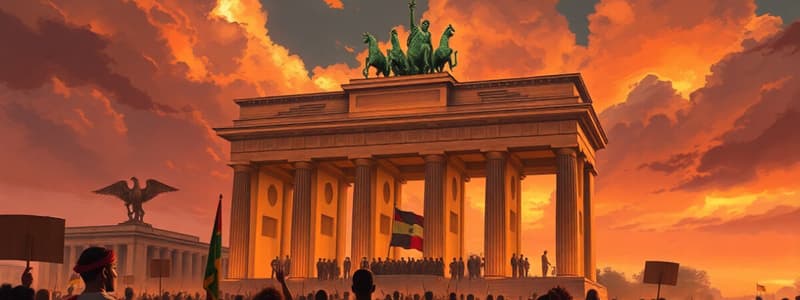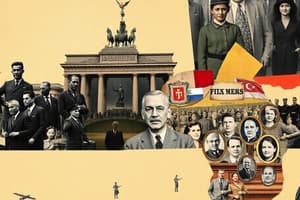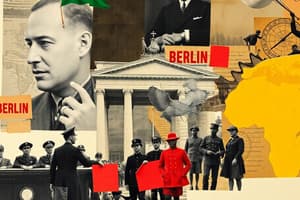Podcast
Questions and Answers
What was one significant impact of World War II in Burma?
What was one significant impact of World War II in Burma?
- Imperial Japan fully conquered Burma
- Achieved complete independence from Britain
- The British regained control post-war (correct)
- Japanese troops remained in Burma
Japan completely conquered Burma during World War II.
Japan completely conquered Burma during World War II.
False (B)
When did Burma achieve independence from Britain?
When did Burma achieve independence from Britain?
January 4, 1948
Japan invaded ______ during World War II, impacting British control.
Japan invaded ______ during World War II, impacting British control.
Match the following events with their outcomes in Southeast Asia:
Match the following events with their outcomes in Southeast Asia:
What event significantly ended Dutch rule in Southeast Asia?
What event significantly ended Dutch rule in Southeast Asia?
The Dutch successfully maintained control over Indonesia throughout the 20th century.
The Dutch successfully maintained control over Indonesia throughout the 20th century.
Who declared Indonesian independence after Japan's surrender in 1945?
Who declared Indonesian independence after Japan's surrender in 1945?
The Dutch used the __________ system to compel farmers to cultivate cash crops on their land.
The Dutch used the __________ system to compel farmers to cultivate cash crops on their land.
Match the following events with their descriptions:
Match the following events with their descriptions:
Flashcards
Burma's independence
Burma's independence
Burma gained freedom from British rule on January 4, 1948.
Malaysian colonization
Malaysian colonization
Malaysia was controlled by the Portuguese in 1511, then the Dutch, and finally the British, who exploited its tin and rubber.
French Indochina
French Indochina
A federation of Vietnam, Laos, and Cambodia under French control, established in 1887.
Burmese rice export
Burmese rice export
Signup and view all the flashcards
Japanese invasion of Burma
Japanese invasion of Burma
Signup and view all the flashcards
Dutch East Indies
Dutch East Indies
Signup and view all the flashcards
Culture System
Culture System
Signup and view all the flashcards
Diponegoro Revolt
Diponegoro Revolt
Signup and view all the flashcards
Indonesian Independence
Indonesian Independence
Signup and view all the flashcards
British Burma
British Burma
Signup and view all the flashcards
Study Notes
Age of Imperialism
- Imperialism is the control one country has over another
- Four types: Colonial, Cultural, Political, and Economic
- Many countries practiced imperialism in the late 1800s
- Africa was divided up by European powers at the Berlin Conference (1884)
- Motivations included raw materials, labor, markets, and the "White Man's Burden"
- Africa was divided without regard to indigenous people, language, or ethnic groups
- Superior weaponry of European powers prevented successful African resistance
- Notable resistance movements: Zulu tribe and Boers
- African nations mostly gained independence in the 1950s and 1960s
- Independence often came with a legacy of poverty and dependence on European nations, lack of knowledge, and education
Africa
- European nations met at the Berlin Conference to divide Africa
- Meeting in 1884
- European countries disregarded the culture, language, and ethnicity of Africa
- Scramble for Africa
- European nations wanted raw materials and labor supplies
- Superior weaponry made it difficult for Africans to fight back
India
- British East India Company gained power in India
- Leading to being called the "Jewel in the Crown" because of its resources.
- The company eventually defeated the Mughal Dynasty and controlled India.
- Positives: railway, infrastructure, schools, and improved administration
- The Sepoy Mutiny (rebellion) occurred due to rumors of rifle cartridges greased with animal fat
- British rule was established in 1757 and lasted until 1947
- The Indian National Congress formed in 1885 to promote Indian involvement
China
- European interest in China began in the late 1200s, with Marco Polo
- China resisted trade and interaction with Europe
- Opium trade led to conflict with European powers
- This led to the Opium Wars of the 19th century
- The British East India company exported opium and China developed a major addiction
- China was forced into unequal treaties, and lost territory (like Hong Kong)
- Boxer Rebellion (1900) in response to the Open Door Policy
- Qing Dynasty ended in 1911, and a civil war followed, leading to the establishment of a communist government in 1949
Indonesia
- The Dutch East India Company was formed in 1602 and gained control of the Indonesian islands.
- Forced labor, Culture System used to obtain resources
- Indonesia was occupied by Japan during WWII, which affected the Dutch rule
- Indonesia gained independence in 1949
Malay Peninsula
- Britain ruled Burma (Myanmar) from 1824-1948
- Burma's resources were important
- Japanese invasion during WWII
- Burma gained independence in 1948
Vietnam, Laos, Cambodia (Indochina)
- France gained control of Indochina in the late 1800s
- Indochina was formed in 1887, initially by combining Vietnam, Cambodia, and Laos then incorporating it
- Natural resources in Indochina (rubber, rice) helped fuel French Imperialism
- French Indochina gained independence in 1954
Philippines, Puerto Rico, and Guam
- The US gained control of the Philippines, Puerto Rico, and Guam after the Spanish-American War (1898)
- US motivated by economic (markets) and political reasons
- Motivations included economic (markets) and political (racial superiority)
- Resistance of Filipinos was met with force
- Philippines gained independence in 1946
- Puerto Rico remains a US territory
Australia
- Indigenous Australians lived there long before European arrival
- European colonization began in 1788
- Discovery of gold in 1850s led to increased European migration
- Australia became a Commonwealth of Britain in 1901 and gained full independence later
Studying That Suits You
Use AI to generate personalized quizzes and flashcards to suit your learning preferences.




